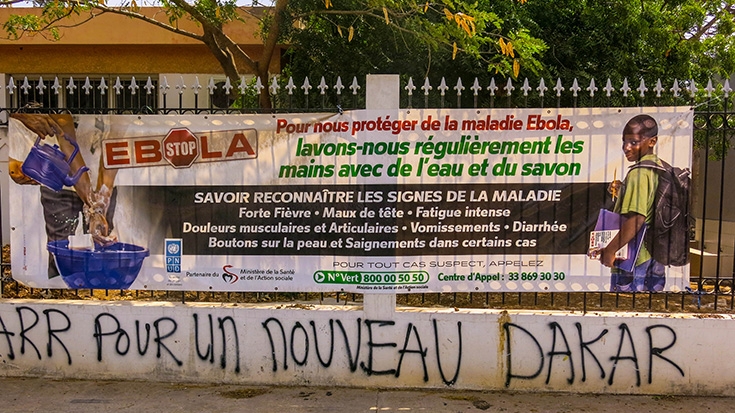The minister shared with her peers the challenges that Senegal faced throughout the management chain that included isolation, medical treatment, monitoring, economic/psychological support of 74 people who were in contact with the patient, communication, addressing stigma, and material and financial resources. She also highlighted the need for coordination on a national and international level to harmonize interventions from government, civil society, the private sector, and technical and financial partners.
One aspect that Minister Seck hopes the entire region will work together on is the search for a vaccine. An infectious disease specialist herself, Awa Marie Coll Seck noted that this recent and most deadly outbreak has made the entire region vulnerable and thus has accelerated the need to develop widespread preventive measures. Senegal is taking the first step towards this goal by hosting a two-day conference that will bring together researchers, health officials, and infectious disease specialists from all over the region to take stock of the progress made towards obtaining a vaccine. She declared her aspirations for Dakar to become “the capital of Ebola research” emphasizing the need to include more researchers in all the stages of the response, ranging from prevention to treatment.
“As the Ebola epidemic begins to subside, it is important nonetheless to remain extremely vigilant given that a new case may occur at any moment,” warns Awa Marie Coll Seck. Learning from Nigeria’s Ebola experience, Senegal has set up a specialized treatment center and has mobilized 30 health workers dedicated to responding at any moment to an Ebola virus emergency alert.
The ministers of health of the Gambia, Omar Sey, of Cote d'Ivoire, Raymonde Coffie Goudou, of Mauritania, Ahmedou Ould Hademine Ould Jelvoune and of Guinea-Bissau, Valentine Mendes also presented their Ebola response and prevention plans. Former Nigerian Minister of Health Onyebuchi Chukwu analyzed his country’s response explaining that “public access to accurate and timely information, through initiatives such as free dial-in lines, was crucial. Such transparency allowed the Nigerian public to have confidence in health authorities to control the spread of the virus.”
Faced with the challenge of porous borders, the participating countries emphasized the importance of rapid identification and diagnosis of Ebola infections. Gambian health officials Modou Njai, Director of Communications and Health Education, and Samba Ceesay, Deputy Director of Health Services, stressed the need for an expedient and reliable diagnostic test that can be administered at various points of entry into the country. Currently, health officials are taking the temperatures of those entering the Gambia, however there has been concerns about the use of anti-parasitic medication which has been found to reduce the fever symptoms that help detect Ebola.
To control the spread of the virus, Mali has been working effectively with the International Migration Agency to track the movement of populations going in and out of the country and raise awareness amongst travelers about the virus’s transmission. In the days following the second video conference, which took place January 14th, Mali was declared Ebola-free by the World Health Organization.
All participants were in agreement on the urgent need to strengthen country health systems, particularly on the community level, in order to boost preparedness and prevention capabilities against the current epidemic and future disease outbreaks.
“These virtual meetings are the starting point of regular exchanges amongst countries in the region and allow them to have productive conversations on larger long term health issues in addition to Ebola prevention,” says Raja Bentaouet-Kattan, World Bank program leader for human development based in Dakar. The ministers requested that the World Bank continue to host video conferences to continue the dialogue at the ministerial level as well as on the technical level for as long as the Ebola virus poses a threat in the sub-region. In addition, they agreed to organize joint field visits in order to improve their response plans.

